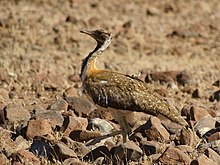Ludwig's bustard
| Ludwig's bustard | |
|---|---|
 |
|
| Scientific classification | |
| Kingdom: | Animalia |
| Phylum: | Chordata |
| Class: | Aves |
| Order: | Otidiformes |
| Family: | Otididae |
| Genus: | Neotis |
| Species: | N. ludwigii |
| Binomial name | |
|
Neotis ludwigii (Rüppell, 1837) |
|
The Ludwig's bustard (Neotis ludwigii) is a species of bird in the bustard family, and named after Baron von Ludwig. It is a medium-to-large sized species. It is found in Angola, Botswana, Lesotho, Namibia, and South Africa. Its habitats include semi-arid grasslands.
The Ludwig's bustard can weigh from 3 to 7.3 kg (6.6 to 16.1 lb), with a mean of 6.3 kg (14 lb) for the much larger male and 3.4 kg (7.5 lb) for the female. Length ranges from 76 to 85 cm (30 to 33 in) in females and 80 to 95 cm (31 to 37 in) in males. It lives largely on large insects (mainly locusts), as well as flowers and seeds. Although it lives in semi-arid areas it seems to shift locally to follow the presence of rainfall. During extreme concentrations of rainfall, as many as 230 Ludwig's bustards have been seen at once feeding on locusts.
This little-known species is now considered endangered. It is thought to be the bird species in Southern Africa most seriously at risk of dying from collisions with power lines.
...
Wikipedia

